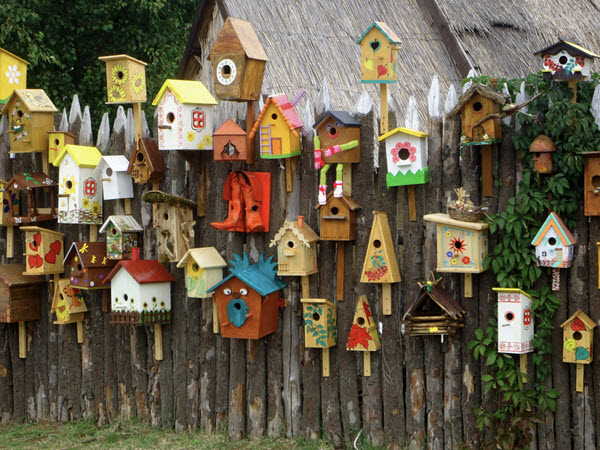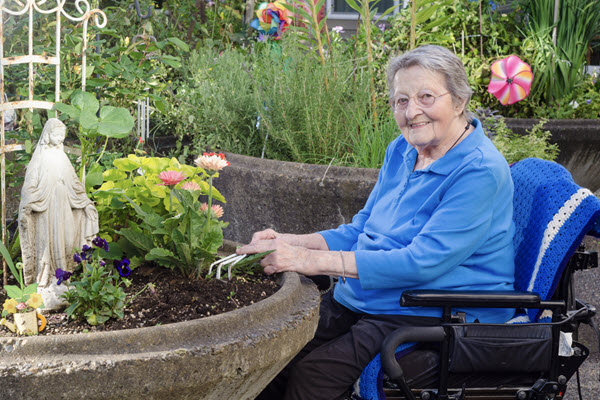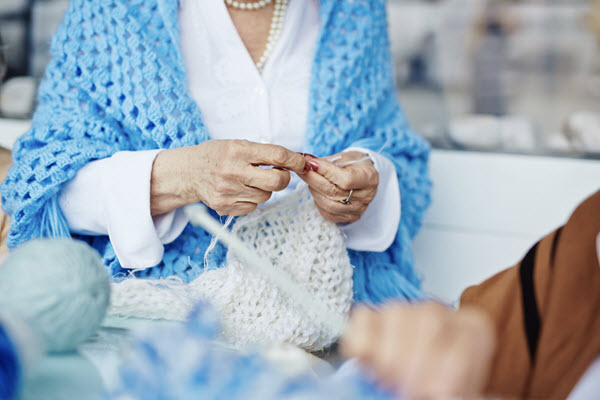It is estimated that people with dementia have about 7 ½ hours of time each day to fill. It is a challenge for the elderly care provider to find fun activities that will fill some of those hours but also fit into the senior’s capability.
Here are seven possible solutions:
1Music
It has been proven that music can have a great impact on people with dementia (1). The songs from their past can make a significant impact. We’ve all seen videos of people with Alzheimer’s who seem completely detached from the world with their head down and nonverbal, but when a Benny Goodman Big Band sound comes on, their head pops up, they smile, and start singing along. It is sometimes startling, but it happens often if not quite so dramatically.
Think about how many times you are listening to an oldies station, and they play a song that you loved as a teenager or early twenties. You are surprised to realize that you can sing right along. You haven’t forgotten a single word.
The same is true of people with dementia. The songs that have the most impact are usually associated with an event or a time period in their life, and hearing that song will bring back memories from that time. Music can also be helpful to lessen anxiety for people with dementia. Listening to soft music can ease anxiety and help calm the person.
2Outdoors

There have been studies done to see what impact being outdoors has on a person with dementia. Realistically, the person with dementia spends more and more time indoors as the disease progresses. The studies appear to show a benefit to the person who spends a part of each day outdoors.
The difficulty is that being outdoors almost requires one-to-one staffing, which is not possible. What can be done is to have an enclosed outdoor area that dementia residents can’t wander from which is filled with activities to engage them.
An example is birding. Maybe a group of dementia residents takes on the project of building bird houses for the area that will attract different types of birds. Another group will be in charge of painting the birdhouses.
Install different types of bird feeders, including hummingbird feeders, and have residents keep them filled. The sugar water for the hummingbird feeder is a simple sugar and water mixture that a resident can help make.
The feeders will be a yearlong project, but the bird houses can be brought in in the winter and cleaned and even repainted, so they are ready for spring. This is a great project for someone who receives elderly care in their home. Just being outdoors for a short walk is valuable or eating a meal outside. The senior home care provider can assist the person with dementia to make a simple picnic lunch to eat outside. Caring for another living thing also provides a sense of self-worth.
3Gardening

Gardening is a lifelong activity that shouldn’t end with dementia. The person may need some help, but there are lots of things that they can do. Think about gardening in pots or raised beds so there is easy access for your senior without having to bend down or kneel on the ground. There are DIY projects online for raised bed designs that allow wheelchair access so everyone can participate.
If you are going to add the birding project, incorporate the garden also. Plant flowers that will attract hummingbirds and butterflies. Plant grasses or cornflowers that have seed heads that the goldfinches can feed on all winter. Plant pots with cherry tomatoes so your senior can pick the tomatoes easily and enjoy them on their salad.
Plant bush beans in your raised bed. The bean seeds are large and easy to handle even for seniors. They are pretty fool-proof and soon your senior will be harvesting enough beans to be able to give some away.
Vegetable gardening is a great way to build your senior’s self-confidence. Producing food that can contribute to their diet is good for their self-esteem.
4Cooking and Baking
If you already have a garden, it’s time to try some new recipes with your senior that use some of what you grew. If you grew zucchini, there are probably plenty to use in recipes. There are all sorts of recipes for zucchini bread, including a “Die by Chocolate” type.
Here’s a simple recipe you can follow if you want to try that out:
If your senior has to watch their weight, try grilling baby zucchini or making a casserole with zucchini slices instead of noodles or potatoes. The key is to find simple recipes that your senior can help to make.
5Artwork

The problem with art projects of the past is that if you needed something less difficult, it was made for children and not age-appropriate. Not today!
There are tons of adult coloring books on different themes. They can be colored with paint or markers. There are also felted pictures for adults to color.
Some people have more talent with 3D art. If painting doesn’t seem to interest your senior, try clay sculpture or needle felting. If your senior is a knitter or likes to crochet, even with dementia they may still be able to make simple pieces.
Many churches, hospitals, and nursing homes are looking for volunteers to make prayer shawls. These are simple rectangular knitted or crocheted shawls that can be worn around the shoulders and give comfort as well as warmth. It will be a chance for your senior to contribute.
6Puzzles and Games
This is another area where you may need to watch out that your game choice is age-appropriate. You don’t want to insult your Dad by asking him to play Go Fish! On the other hand, it might be the perfect game for a grandchild to play with him.
Bingo is always a favorite for all ages. It seems to be something people with dementia can play as long as the speed of the game isn’t too fast.
Jigsaw puzzles are also a favorite. The puzzles with fewer pieces always seemed to be kid topics like Disney characters. Today, puzzles can be done online, and you can decide how many pieces you want for your puzzle. The pictures are age-appropriate and they also have a sound that is made when you place the correct piece.
7Scrapbooking
You can help your senior to make a new scrapbook, but even better is to look at old scrapbooks with them and encourage them to share their memories. Almost everyone has a scrapbook of their wedding day, and that can lead to a talk about how they met or what the day was like.
Each of these projects and ideas is adjustable for the level of dementia your senior has. Be flexible and prepared to modify the project to fit their current level. Most important: Have fun together!
References:
1. Koger, S. M., & Brotons, M. (2000). Music therapy for dementia symptoms. The Cochrane database of systematic reviews, (3), CD001121-CD001121.
Author Bio: Susan Ashby joined the Superior Senior Care team in July of 2014 as Community Relations Manager. With over 27 years of experience in geriatric health, Susan brings a wealth of knowledge and insight to Superior Senior Care and plays an integral part in connecting consumers and communities with resources for independent living.



















